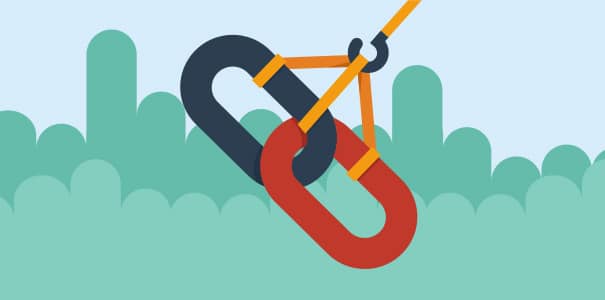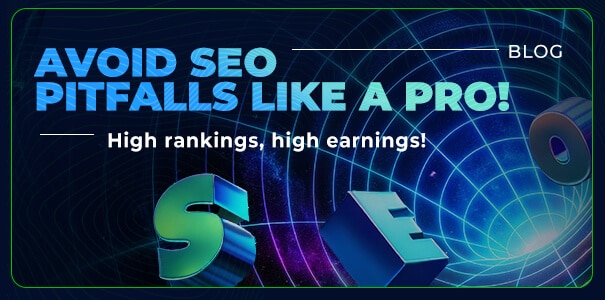Search Engine Optimization (SEO) doesn’t have to be complicated. There are steps you can take right now to boost your visibility on search engines in the short-term without ruining yourself. One of them is establishing a great link building strategy.
Think of your website as a spider’s net: each page plays an important role in luring & catching your “prey” (visitors), but alone, they’re pretty much worthless. It’s their combined strength that help create a cohesive structure that will boost your rank on the World Wide Web.
Today, we’re going to help you become a master weaver by first understanding what internal links and backlinks are.
So, what exactly is an Internal Link?
When specific keywords or anchor text link to content within your own site or domain, it’s called an internal link. Not to be confused with external links which lead to another site or resource.
Internal link example
<a href=”https://www.yourdomain.com/another-great-post” title=”Another Great Post”>Another Great Post</a>
External link example
<a href=”https://www.google.com” title=”Google”>Google</a>
Why Are Internal Links Great for SEO?
The reason why internal links must be part of your link building strategy is simple: they establish your site’s architecture.
Each page on your site has what Moz calls Page Authority (PA). It’s a logarithmic scale ranging from 0 to 100; the higher, the better for ranking on Search Engine Result Pages (SERPs). Page Authority is calculated like Domain Authority but on a micro level. There are more than 40 factors taken into account for calculating the score, including link counts.
Remember the spider’s net analogy? Well, Google needs to be able to crawl your content with its own spider (also known as the less frightening Googlebot) in order to discover and index all of your pages. You don’t want your site’s structure to look like a hedge maze. Internal links is how you make sure search engines don’t get lost or miss valuable content.
Internal links pointing to relevant pages help visitors stay on your site longer by providing a more targeted experience, thus reducing bounce rate and furthering engagement. They also serve to point out your most important content. If there are numerous internal links all pointing to the same page, you’re sending a signal that this page is really important — something search engines’ algorithms understand and factor in when ranking your site.
Are external links bad for SEO?
You may be tempted to only link to your own content as to not lose “link juice,” thinking you’d be diluting your site’s authority. However, linking to external resources relevant to your site is actually a good strategy.
External links or outbound links are a vote of confidence for another site. The Internet is a community-driven space and such links help Google connect the dots, as Yoast pointed out eloquently.
While external links might not boost your personal SEO directly, they help search engines find quality content across the web.
On one hand it might be thought of as an altruistic approach; on the other, giving other (3rd party) sites a pat on the back in the form of great backlinks (more on that below) might be just what you need to boost your own ranking.
Plus, studies have shown that outgoing links DO have a positive impact on SEO when used properly.
Backlinks: the bread and butter of SEO
Unless you’re totally new to SEO and webmastering, you’ve probably heard of backlinks (also called inbound links): links that point to your site from external sources. Let’s say you really enjoy this blog post: if you were to link to it from your own site, that’d mean you'd be giving us a backlink. Well, as long as you don’t add the “nofollow” html parameter.
Backlinks are probably one of the things you want most because it means your site offers valuable content. Do note that the quality of backlinks is also important: if you only get linked from spammy or shady sources with poor Domain Authority (DA), you might even be penalized for it!
Use a simple and free tool like Valuable Backlinks Checker to get a rough picture of your current situation. Domains with poor ratings or that don’t provide value to their visitors should probably be cleaned. Notice the italics: it’s important to do a thorough SEO audit of your site before removing backlinks. The last thing you want is to remove a backlink that actually helped you rank better on search engines!
How to spot bad backlinks
A word of caution: do not use automated tools for this. As pointed out earlier, false positives could really end up tanking your ranking if you’re not careful.
Here’s a few characteristics bad links have in common:
- Poor citation flow (influence based on number of sites linking to it)
- Poor trust flow
- High spam score (no surprise)
- “Nofollow” parameter
On top of that, bad links often come from duplicate content, link directories or auto-approved comments.
How to remove bad backlinks
If you want to get rid of bad backlinks, you only have two options:
- Contact the owner of the site that links to yours and politely ask to remove the backlink. If you’re not sure how to find the contact information, run a Whois search. Note that many webmasters choose to not publicly disclose their real emails.
- Use the Google Webmaster Tools Disavow Links Tool as a last resort. You should always, always try to remove bad backlinks yourself before creating this report.
How to earn quality backlinks
By now, you’re probably wondering how to get quality backlinks that will boost your SEO as part of your overall link building strategy. We have two answers for you that do require some effort:
- Your first option is to start guest blogging for authority websites in your niche. That’s assuming you do content marketing to a certain extent, of course. The cool thing about writing content on another relevant site is how it’s a win-win-win: for you, the webmaster and the visitors.
- When one of your hyperlinks includes a keyword you’re trying to rank for, we call that anchor text. So instead of using for instance the old “click here” call-to-action, you’d use something like “read our tips on how to become a super affiliate” which resonates with your content and might give you a slight SEO boost. Don’t hesitate to contact webmasters pointing to your site and ask them to change the anchor text to something that will have more impact with search engines!
Can you establish a link building strategy with adult content?
That’s something we’ve thought about while writing this post and the answer is definitely “yes.”
Adult webmasters face different challenges than mainstream ones, that’s for sure.
Yet, we feel they can apply the same winning strategies no matter what. Anchor text still works. Guest blogging is also possible, albeit tough to pull off.
Here’s some tips and ideas to get you started:
- Make a list of all the sites where you’d like to have a backlink. Use citation flow, trust flow and Domain Authority (DA) as filters to keep less valuable sources out of your strategy.
- Sponsor a post about your site on a well-known place. This can be costly, so make sure to use tools like AHREFs or SemRush to evaluate if the price is right. Quality backlinks might cost you hundreds of dollars upfront with the potential of giving your brand a much needed kick.
- Get involved: start commenting on popular sites and add your own signature leading to your domain. Be careful to not blow your chance because there’s a thin line between what’s considered spam and helpful contributions.
- Avoid link dumps and black hat tactics at all cost or face the wrath of the search engines.
- Build partnerships with other adult webmasters, start networking and create a name for yourself. It’s easy for people to smell you from miles away if you’re full of crap!
- Submit your site to a link directory, especially those that will review your site too, like primepornlist. Most of the advice you’ve just read also applies to other types of sites, so you can see it’s not that complicated to run a successful adult site with a great link building strategy. Just don’t try to share your content on social networks, well, at least not Facebook! Twitter and Tumblr is fine though.
How will link building impact your activities?
In a nutshell, great links will grow your audience and eventually boost your ranking on search engines. It’s you trying to leave your mark on the Internet.
Not only will you achieve greater brand visibility, you will also take a bite at the competition — eventually becoming an influencer yourself.
Here’s a quick recap of the many benefits from having a great link building strategy:
- Boosted visibility in SERPs
- New traffic sources
- New networking opportunities
What all of these points have in common? They lead to bigger sales and authority online.
Strength lies in numbers
How do you treat your links? Feel free to share your experience in the comments section below. Not sure why you should contribute? Go back and re-read about backlinks. Oh, and you all share affiliation as an interest, so go ahead and network! ;)



